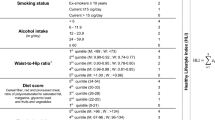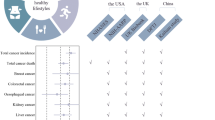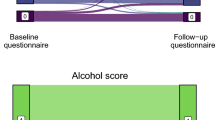Abstract
Purpose
Lifestyle factors such as smoking, alcohol, body weight, physical activity, and diet quality have been associated with the risk of pancreatic cancer. However, studies of their combined association in women are limited.
Methods
Data on smoking habits, alcohol intake, diet composition, recreational physical activity, body weight, and waist circumference, obtained at recruitment for 136,945 postmenopausal women (aged 50–79 years) participating in the Women’s Health Initiative study, were categorized separately, with higher scores for each variable assigned to the categories representing healthier behaviors. The combined healthy lifestyle index (HLI) score, created by summing the scores for each risk factor, was grouped into quartiles. We used multivariable-adjusted Cox regression to estimate hazard ratios (HR) and 95% confidence intervals (CI) for pancreatic cancer risk in association with the HLI.
Results
Over an average follow-up period of approximately 16.0 years, 1,119 incident cases of pancreatic cancer were ascertained. Compared to women in the lowest HLI quartile, those in the upper quartiles (qt) had a reduced risk of pancreatic cancer (multivariable-adjusted HRqt3rd 0.83, 95% CI 0.74–0.99; and HRqt4th 0.74, 95% CI 0.62–0.88, respectively, p trend = 0.001). Use of waist circumference instead of BMI in the HLI score yielded similar results. Among women who were either non-diabetic or non-smokers, high HLI was also associated with reduced risk (HRqt4th 0.78, 95% CI 0.65–0.85 and HRqt4th 0.80, 95% CI 0.66–0.97, respectively). Stratification by BMI categories (18.5− < 25.0, 25.0− < 30.0 and > 30.0 kg/m2) showed similar results in all groups.
Conclusions
Our findings suggest that in postmenopausal women, a healthy lifestyle is associated with reduced risk of pancreatic cancer.
Similar content being viewed by others
Data availability
Data are available through the WHI online resource, https://www.whi.org/researchers/data/Pages/Home.aspx, and the WHI remains funded indefinitely through BioLINCC, https://biolincc.nhlbi.nih.gov/studies/whi_ctos/.
Change history
26 July 2023
A Correction to this paper has been published: https://doi.org/10.1007/s10552-023-01754-3
References
Siegel RL, Miller KD, Jemal A (2020) Cancer statistics, 2020. CA Cancer J Clin 70:7–30. https://doi.org/10.3322/caac.21590
McGuigan A, Kelly P, Turkington RC, Jones C, Coleman HG, McCain RS (2018) Pancreatic cancer: A review of clinical diagnosis, epidemiology, treatment and outcomes. World J Gastroenterol 24:4846–4861. https://doi.org/10.3748/wjg.v24.i43.4846
Kleeff J, Korc M, Apte M, La Vecchia C, Johnson CD, Biankin AV et al (2016) Pancreatic cancer. Nat Rev Dis Primers 2:16022. https://doi.org/10.1038/nrdp.2016.22
Ducreux M, Seufferlein T, Van Laethem JL, Laurent-Puig P, Smolenschi C, Malka D et al (2019) Systemic treatment of pancreatic cancer revisited. Semin Oncol 46:28–38. https://doi.org/10.1053/j.seminoncol.2018.12.003
The global, regional, and national burden of pancreatic cancer and its attributable risk factors in 195 countries and territories, 1990–2017: a systematic analysis for the Global Burden of Disease Study 2017. Lancet Gastroenterol Hepatol. 4(2019) 934–947. https://doi.org/10.1016/s2468-1253(19)30347-4.
Maisonneuve P, Lowenfels AB (2015) Risk factors for pancreatic cancer: a summary review of meta-analytical studies. Int J Epidemiol 44:186–198. https://doi.org/10.1093/ije/dyu240
Midha S, Chawla S, Garg PK (2016) Modifiable and non-modifiable risk factors for pancreatic cancer: a review. Cancer Lett 381:269–277. https://doi.org/10.1016/j.canlet.2016.07.022
Koyanagi YN, Ito H, Matsuo K, Sugawara Y, Hidaka A, Sawada N et al (2019) Smoking and pancreatic cancer incidence: a pooled analysis of 10 population-based cohort studies in Japan. Cancer Epidemiol Biomarkers Prev 28:1370–1378. https://doi.org/10.1158/1055-9965.Epi-18-1327
Cigarette smoking and pancreatic cancer: an analysis from the International Pancreatic Cancer Case-Control Consortium (Panc4). Ann Oncol. 23(2012) 2773. https://doi.org/10.1093/annonc/mds491.
Chuang SC, Gallo V, Michaud D, Overvad K, Tjønneland A, Clavel-Chapelon F et al (2011) Exposure to environmental tobacco smoke in childhood and incidence of cancer in adulthood in never smokers in the European Prospective Investigation into Cancer and Nutrition. Cancer Causes Control 22:487–494. https://doi.org/10.1007/s10552-010-9723-2
Rebours V, Gaujoux S, d’Assignies G, Sauvanet A, Ruszniewski P, Lévy P et al (2015) Obesity and fatty pancreatic infiltration are risk factors for pancreatic precancerous lesions (PanIN). Clin Cancer Res 21:3522–3528. https://doi.org/10.1158/1078-0432.Ccr-14-2385
Berrington de Gonzalez A, Sweetland S, Spencer E (2003) A meta-analysis of obesity and the risk of pancreatic cancer. Br J Cancer 89:519–523. https://doi.org/10.1038/sj.bjc.6601140
Casari I, Falasca M (2015) Diet and Pancreatic Cancer Prevention. Cancers (Basel) 7:2309–2317. https://doi.org/10.3390/cancers7040892
Hine RJ, Srivastava S, Milner JA, Ross SA (2003) Nutritional links to plausible mechanisms underlying pancreatic cancer: a conference report. Pancreas 27:356–366. https://doi.org/10.1097/00006676-200311000-00014
Nöthlings U, Wilkens LR, Murphy SP, Hankin JH, Henderson BE, Kolonel LN (2005) Meat and fat intake as risk factors for pancreatic cancer: the multiethnic cohort study. J Natl Cancer Inst 97:1458–1465. https://doi.org/10.1093/jnci/dji292
Harris DM, Srihari P, Go VLW (2011) Pancreatic Cancer Prevention and the 2010 Dietary Guidelines for Americans. 40:641–643. https://doi.org/10.1097/MPA.0b013e3182203e3c
Zheng J, Guinter MA, Merchant AT, Wirth MD, Zhang J, Stolzenberg-Solomon RZ et al (2017) Dietary patterns and risk of pancreatic cancer: a systematic review. Nutr Rev 75:883–908. https://doi.org/10.1093/nutrit/nux038
Wang YT, Gou YW, Jin WW, Xiao M, Fang HY (2016) Association between alcohol intake and the risk of pancreatic cancer: a dose-response meta-analysis of cohort studies. BMC Cancer 16:212. https://doi.org/10.1186/s12885-016-2241-1
Behrens G, Jochem C, Schmid D, Keimling M, Ricci C, Leitzmann MF (2015) Physical activity and risk of pancreatic cancer: a systematic review and meta-analysis. Eur J Epidemiol 30:279–298. https://doi.org/10.1007/s10654-015-0014-9
Maisonneuve P (2019) Epidemiology and burden of pancreatic cancer. Presse Med 48:e113–e123. https://doi.org/10.1016/j.lpm.2019.02.030
Islami F, Goding Sauer A, Miller KD, Siegel RL, Fedewa SA, Jacobs EJ et al (2018) Proportion and number of cancer cases and deaths attributable to potentially modifiable risk factors in the United States. CA Cancer J Clin 68:31–54. https://doi.org/10.3322/caac.21440
Song M, Giovannucci E (2020) Preventable incidence of carcinoma associated with adiposity, alcohol and physical inactivity according to smoking status in the United States. Int J Cancer 146:2960–2967. https://doi.org/10.1002/ijc.32602
Ghosn B, Benisi-Kohansal S, Ebrahimpour-Koujan S, Azadbakht L, Esmaillzadeh A (2020) Association between healthy lifestyle score and breast cancer. Nutr J 19:4. https://doi.org/10.1186/s12937-020-0520-9
Arthur R, Brasky TM, Crane TE, Felix AS, Kaunitz AM, Shadyab AH et al (2019) Associations of a healthy lifestyle index with the risks of endometrial and ovarian cancer among women in the women’s health initiative study. Am J Epidemiol 188:261–273. https://doi.org/10.1093/aje/kwy249
Dartois L, Fagherazzi G, Boutron-Ruault MC, Mesrine S, Clavel-Chapelon F (2014) Association between five lifestyle habits and cancer risk: results from the E3N cohort. Cancer Prev Res (Phila) 7:516–525. https://doi.org/10.1158/1940-6207.Capr-13-0325
Barbaresko J, Rienks J, Nöthlings U (2018) Lifestyle indices and cardiovascular disease risk: a meta-analysis. Am J Prev Med 55:555–564. https://doi.org/10.1016/j.amepre.2018.04.046
Li Y, Schoufour J, Wang DD, Dhana K, Pan A, Liu X et al (2020) Healthy lifestyle and life expectancy free of cancer, cardiovascular disease, and type 2 diabetes: prospective cohort study. BMJ 368:l6669. https://doi.org/10.1136/bmj.l6669
Jiao L, Mitrou PN, Reedy J, Graubard BI, Hollenbeck AR, Schatzkin A et al (2009) A combined healthy lifestyle score and risk of pancreatic cancer in a large cohort study. Arch Intern Med 169:764–770. https://doi.org/10.1001/archinternmed.2009.46
Naudin S, Viallon V, Hashim D, Freisling H, Jenab M, Weiderpass E et al (2020) Healthy lifestyle and the risk of pancreatic cancer in the EPIC study. Eur J Epidemiol 35:975–986. https://doi.org/10.1007/s10654-019-00559-6
(1998) Design of the Women's Health Initiative clinical trial and observational study. The Women's Health Initiative Study Group. Control Clin Trials. 19:61–109. https://doi.org/10.1016/s0197-2456(97)00078-0.
Langer RD, White E, Lewis CE, Kotchen JM, Hendrix SL, Trevisan M (2003) The Women’s Health Initiative Observational Study: baseline characteristics of participants and reliability of baseline measures. Ann Epidemiol 13:S107–S121. https://doi.org/10.1016/s1047-2797(03)00047-4
Arthur R, Wassertheil-Smoller S, Manson JE, Luo J, Snetselaar L, Hastert T et al (2018) The combined association of modifiable risk factors with breast cancer risk in the women’s health initiative. Cancer Prev Res (Phila) 11:317–326. https://doi.org/10.1158/1940-6207.Capr-17-0347
Patterson RE, Kristal AR, Tinker LF, Carter RA, Bolton MP, Agurs-Collins T (1999) Measurement characteristics of the Women’s Health Initiative food frequency questionnaire. Ann Epidemiol 9:178–187. https://doi.org/10.1016/s1047-2797(98)00055-6
Belin RJ, Greenland P, Allison M, Martin L, Shikany JM, Larson J et al (2011) Diet quality and the risk of cardiovascular disease: the Women’s Health Initiative (WHI). Am J Clin Nutr 94:49–57. https://doi.org/10.3945/ajcn.110.011221
McCullough ML, Feskanich D, Stampfer MJ, Giovannucci EL, Rimm EB, Hu FB et al (2002) Diet quality and major chronic disease risk in men and women: moving toward improved dietary guidance. Am J Clin Nutr 76:1261–1271. https://doi.org/10.1093/ajcn/76.6.1261
Chiuve SE, Fung TT, Rimm EB, Hu FB, McCullough ML, Wang M et al (2012) Alternative dietary indices both strongly predict risk of chronic disease. J Nutr 142:1009–1018. https://doi.org/10.3945/jn.111.157222
Ainsworth BE, Haskell WL, Leon AS, Jacobs DR Jr, Montoye HJ, Sallis JF et al (1993) Compendium of physical activities: classification of energy costs of human physical activities. Med Sci Sports Exerc 25:71–80. https://doi.org/10.1249/00005768-199301000-00011
Aune D, Greenwood DC, Chan DS, Vieira R, Vieira AR, Navarro Rosenblatt DA et al (2012) Body mass index, abdominal fatness and pancreatic cancer risk: a systematic review and non-linear dose-response meta-analysis of prospective studies. Ann Oncol 23:843–852. https://doi.org/10.1093/annonc/mdr398
Liu S, Tinker L, Song Y, Rifai N, Bonds DE, Cook NR et al (2007) A prospective study of inflammatory cytokines and diabetes mellitus in a multiethnic cohort of postmenopausal women. Arch Intern Med 167:1676–1685. https://doi.org/10.1001/archinte.167.15.1676
Curb JD, McTiernan A, Heckbert SR, Kooperberg C, Stanford J, Nevitt M et al (2003) Outcomes ascertainment and adjudication methods in the Women’s Health Initiative. Ann Epidemiol 13:S122–S128. https://doi.org/10.1016/s1047-2797(03)00048-6
Everhart J, Wright D (1995) Diabetes mellitus as a risk factor for pancreatic cancer. A meta-analysis. JAMA 273:1605–1609
Eibl G, Cruz-Monserrate Z, Korc M, Petrov MS, Goodarzi MO, Fisher WE et al (2018) Diabetes mellitus and obesity as risk factors for pancreatic cancer. J Acad Nutr Diet 118:555–567. https://doi.org/10.1016/j.jand.2017.07.005
Toi PL, Anothaisintawee T, Chaikledkaew U, Briones JR, Reutrakul S, Thakkinstian A (2020) Preventive role of diet interventions and dietary factors in type 2 diabetes mellitus: an umbrella review. Nutrients. https://doi.org/10.3390/nu12092722
Jin Q, Hart PA, Shi N, Joseph JJ, Donneyong M, Conwell DL et al (2021) Dietary patterns of insulinemia, inflammation and glycemia, and pancreatic cancer risk: findings from the women’s health initiative. Cancer Epidemiol Biomarkers Prev 30:1229–1240. https://doi.org/10.1158/1055-9965.Epi-20-1478
Klein AP (2021) Pancreatic cancer epidemiology: understanding the role of lifestyle and inherited risk factors. Nat Rev Gastroenterol Hepatol 18:493–502. https://doi.org/10.1038/s41575-021-00457-x
Andersen DK, Korc M, Petersen GM, Eibl G, Li D, Rickels MR et al (2017) Diabetes, pancreatogenic diabetes, and pancreatic cancer. Diabetes 66:1103–1110. https://doi.org/10.2337/db16-1477
Acknowledgments
We thank the Women's Health Initiative investigators, staff, and the trial participants for their outstanding dedication and commitment. Program Office: (National Heart, Lung, and Blood Institute, Bethesda, MD) Jacques Roscoe, Shari Ludlum, Dale Burden, Joan McGowan, Leslie Ford, and Nancy Geller. Clinical Coordinating Center: (Fred Hutchinson Cancer Research Center, Seattle, WA) Garnet Anderson, Ross Prentice, Andrea LaCroix, and Charles Kopperberg). Investigators and Academic Centers: (Brigham and Women's Hospital, Harvard Medical School, Boston, MA) JoAnn E, Manson; (MedStar Health Research Institute/Howard University, Washington, DC) Barbara V Howard; (Stanford Prevention Research Center, Stanford, CA) Marcia L. Stefanick; (The Ohio State University, Columbus, OH) Rebecca Jackson; (University of Arizona, Tucson/Phoenix, AZ) Cynthia A. Thompson; (University at Buffalo, Buffalo, NY) Jean Wactawski-Wende; (University of Florida, Gainesville/Jacksonville, FL) Marian Limacher; (University of Iowa, Iowa City/Davenport, IA) Robert Wallace; (University of Pittsburgh, Pittsburgh, PA) Lewis Kuller; (City of Hope Comprehensive Cancer Center, Duarte, CA) Rowan T. Chlebowski; (Wake Forest University School of Medicine, Winston–Salem, NC) Sally Shumaker. Women's Health Initiative Memory Study: (Wake Forest University School of Medicine, Winston Salem, NC) Sally Shumaker. A full list of all the investigators who have contributed to Women's Health Initiative science appears at https://www.whi.org/researchers/Documents%20%20Write%20a%20Paper/WHI%20Investigator%20Long%20List.pdf
Funding
This work was supported by Women’s Health Initiative. The WHI program is funded by the National Heart, Lung, and Blood Institute, National Institutes of Health, U.S. Department of Health and Human Services through contracts HHSN268201600018C, HHSN268201600001C, HHSN268201600002C, HHSN268201600003C, and HHSN268201600004C.
Author information
Authors and Affiliations
Contributions
Conceptualization—TER. Data curation, formal analysis, and investigation RP. Methodology—RP: writing—original draft—RP, TER. Writing—rewriting and editing—all authors.
Corresponding authors
Ethics declarations
Conflict of interest
The authors declare that they have no conflict of interest.
Ethical approval
All procedures in the study were in accordance with the ethical standards of the institutional research committee and with the 1964 Helsinki Declaration and its later amendments. The study was approved by institutional review boards at all 40 clinical centers and at the coordinating center.
Informed consent
All participants in the WHI gave written-informed consent.
Additional information
Publisher's Note
Springer Nature remains neutral with regard to jurisdictional claims in published maps and institutional affiliations.
The original online version of this article was revised: The co-author has been revised.
Supplementary Information
Below is the link to the electronic supplementary material.
Rights and permissions
Springer Nature or its licensor (e.g. a society or other partner) holds exclusive rights to this article under a publishing agreement with the author(s) or other rightsholder(s); author self-archiving of the accepted manuscript version of this article is solely governed by the terms of such publishing agreement and applicable law.
About this article
Cite this article
Peila, R., Coday, M., Crane, T.E. et al. Healthy lifestyle index and risk of pancreatic cancer in the Women’s Health Initiative. Cancer Causes Control 33, 737–747 (2022). https://doi.org/10.1007/s10552-022-01558-x
Received:
Accepted:
Published:
Issue Date:
DOI: https://doi.org/10.1007/s10552-022-01558-x




